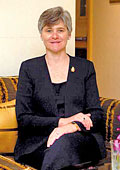 |
|
"This is a period of time when CEOs understand
that people can make a difference. Now is the turn of the
knowledge economy"
|
As
the chairman & CEO of $2.36 billion Mercer,
Michele Burns heads the largest human resource consulting
firm in the world, with 15,000 employees in 180 different cities.
Yet, the interesting thing is, before she took over her current
job in September last year, Burns was a numbers person, not a
people's person. She was the chief financial officer at Marsh
& McLennan Companies (MMC), Mercer's parent company, and prior
to that she was a Chief Restructuring Officer, responsible for
turning around another MMC subsidiary, Mirant Corp. So, the crossover
from the world of hard numbers to touchy-feely people issues must
have been daunting for Burns, right? Not really, says the lady,
who's also on the boards of Wal-Mart and Cisco Systems. After
all, the accountancy major began her career in consulting with
Arthur Andersen and for 18 years worked closely with various clients.
Recently in India on her first visit as Mercer CEO, Burns, accompanied
by Mercer's head of Asia, Rajan Srikanth and India head, R. Sankar,
spoke to BT's R. Sridharan on
people issues and India plans. Excerpts:
If you talk to CEOs around the world,
they will tell you that human capital management is the single
thing they most worry about. So, is managing people going to get
easier or a whole lot harder in the years ahead?
I think it's going to be at least as difficult,
if not more. This is a period of time when (CEOs) understand that
people can make a difference. If you look at it in a different
way, the last decade has been the decade of technology-fuelled
productivity. Now is the turn of the knowledge economy. There
are two things happening. One, we have to continue to improve
productivity because that's how we continue to have the economy
grow. But people aren't machines, so the soft side of people and
the soft side of engagement and the soft side of working with
creating productivity through positive re-enforcement such as
training, development and career pathing are the new ways in which
the CEOs and their hr directors and CFOs will seek to boost productivity.
Having said that, is there a disconnect
between what CEOs profess and what they do? For example, how many
CEOs are there who were, say, HR directors? More likely than not,
they would have been heads of marketing or finance.
I think that (view) is much more historical
in nature, and it depends on the industry. But practically speaking,
hr organisations have been viewed as less strategic and perhaps
haven't taken that seat at the table in a real strategic way.
In a way you could argue that maybe finance was viewed the same
way. Finance was viewed as a very important function in a corporation,
and depending on the company it had different seats at the table.
But it was not necessarily viewed as a strategic partner. But
after 9/11 all the economies experienced a hiccup that they hadn't
ever experienced as a globe before, and CFOs became even more
important at their tables. I would suggest to you the same things
would begin to happen now, because now people issues are the leading
indicator. So what does it mean? The hr directors of today, the
key hr people have to make sure they meet that strategic imperative.
So, when the CEO does link the two and looks at both, the CFO
and the hr director, the hr director needs to be able to deliver
strategic advice and be able to take that seat at the table.
Talking about workplace, my sense is that
the workplace is changing faster than the tools and techniques
companies currently have to manage it. Is that perception correct?
That's an excellent question. But I really
don't think there are that many different value drivers and that
many fundamental things that you have to do. When I made a presentation
recently, some of the statistics that were relevant to the Indian
employer, if you read it, you could have been anywhere. So, trust
in the employee-employer relationship, appropriate pay, reasonable
work-life balance…it doesn't matter what company you are
in and what country you are in. Those tend to be the things that
drive employee engagement.
What I meant was, if you look at the workplace
today, you are dealing with knowledge workers, and not the blue-collar
variety. So, the tools and techniques one would need to measure
their performance and reward them, and to motivate and retain
them would be different.
It's a complex issue, but people have been
doing it for quite a while now. Cisco Systems, Google and Microsoft
are relative newcomers, but they have attracted talented people
and created very sticky cultures.
Sankar: Particularly for large companies,
what's important (in dealing with such issues) is a willingness
to look at the workforce in a segmented way. That is, not all
people are the same and to engage people who have different needs.
For example, an R&D guy doesn't necessarily care for a vertical
career or titles…like every two years becoming a general
manager or VP or anything like that. His needs are somewhat different.
Are we in a position to recognise those needs and keep those employees,
valuable employees engaged and keep them engaged as to deliver
on their aspirations? To my mind hr managers are not proactive
enough. They want to follow; 'oh, somebody is doing it, it's best
practice', and by the time they think it's time to do something,
the guy has left. We are not innovative enough to say 'this group
needs to be treated differently'.
 |
|
"It is true that good business performance
drives people to stay with a company. But high performance
companies don't always have happy employees"
|
Retention is proving to be a major problem
as well. Everyone is expanding, everyone is scrambling for people,
and people are able to leave jobs more easily. Is it safe to say
that high attrition is here to stay?
In this economy, employee attrition and retention
will be an issue for years to come not days or months. Part of
the issue is fuelled by a couple of things: you've got immense
growth, with Indian companies growing and multinational companies
growing here. The other part is, despite India's large pool of
graduates, most of them need to be trained to put to work. So,
the actual shortage is even bigger. But retention is about employee
engagement. If you build an engagement model that engages employees,
it makes the employer-employee relationship more sticky. The local
company here has to compete with multinational companies for talent.
However, multinational companies should not rely solely on the
strength of their brand. It can lead to some false starts in the
area.
That's an interesting point because even
in our Best Companies to Work for surveys (where Mercer is the
knowledge partner), we don't have too many MNC brands in the top
10.
Sankar: In
fact, that's a point that came up in our presentation earlier
this afternoon…
Srikanth: Actually, (the delegates)
were reading into it more than what Shankar eventually let them.
They were saying, 'Hey, look maybe it means multinationals don't
have employee value proposition right'.
So are MNCs depending too much on their
brand?
I don't know this. But I would suspect multinationals
know one other thing and which is, they have the brand perhaps
to leverage, but generally local companies are going to have an
advantage because they are local companies and people feel that
way. People feel positively about local companies and about local
companies doing well. That's true everywhere...
Srikanth: I think it's a market maturity
thing. India has reached a point where people have a choice and
people actually have evidence out there, they believe that Indian
companies are much better employers and have much better prospects.
The pride has come back. When I studied here, that was never the
case.
But could it be that MNC employees are
more demanding and have higher expectations of their employers
than people working in Indian companies?
Sankar:
We haven't found that…
Srikanth: I think each is demanding
in their own way.
Sankar: If you are working in a multinational
company, management is more process driven. There's a way to do
things and you follow rules, processes and so on. That can be
a huge plus and also be a huge minus. The minus aspect is very
important for professionals who want to make things happen and
who want to be empowered to deliver. They see that beyond a certain
point you can't do that in a large corporation. If you are an
Indian company you probably need to empower because you don't
have the systems of a large MNC. So that's a big motivator for
somebody who wants to say, 'I built this company'.
Another interesting thing that emerges
from our surveys is that best employers need not be the best companies
in terms of market performance…
Sankar:
…or even compensation. If you just look at the list, there's
hardly one of them that is at, say, the 75th percentile in pay
in their industry. That's a striking feature, yet they are rated
amongst the best. There are some things that matter beyond compensation.
Burns: From my perspective, it must
mean-I don't know the companies-that despite the companies' performance,
they have built an engagement model where people will stay even
through that. Because it is absolutely true that good business
performance drives people to stay with companies. But high performance
companies don't always have happy employees. They have one of
the factors already, and which is a reason to stay, and it's a
matter of 'do they communicate well, do they involve the employee,
whether the employee feels a part of that, that they are successful'.
Sankar: If a company continues to
under-perform significantly, then happy employees will cease to
be happy after a while.
 |
|
"If you build an engagement model that
engages employees, it makes the employer-employee relationship
more sticky"
|
So, what's the secret sauce that goes into
keeping employees happy?
First of all, if you were to look at an employee
engagement survey, you would not find the top thing being compensation
at all. The top thing is trust in management. So, really to me
that very metric is a combination of two things. There's a lot
of engagement right through, and you have to have an environment
of transparency. The second thing is, throughout the middle management
you have to have a consistent communication cascade. That you
are communicating what the company is doing, why the company is
making the decisions it's making, and the team, far beyond the
top senior management, has to be aligned to communicate that all
the way through the line. That's the first driver. The second
one can be compensation.
Sankar: It's the fairness of compensation,
relative to your peers, which seems to be more important than
the absolute amounts. 'How am I being paid relative to my peer?'
is what people are more concerned about, rather than 'I should
be the best paid employee on the face of the earth.'
Finally, how significant is India in Mercer's
scheme of things globally and what are your plans here?
India is a very key focus area for us. Asia
in general is a key focus area, given the size and breadth of
the firm. In India, we believe we are the consultants of choice
in many ways, and we want to continue to be that in a very meaningful
way. Secondly, we see India as a place where we can have a more
general operations centre or global operations centre. We are
already doing little bits of benefits administration work, actuarial
work and data mining work. We are around 400-plus employees, but
we expect that to continue to ramp and I would be very surprised
if we are not into 1000s easily in a couple of years.
|







